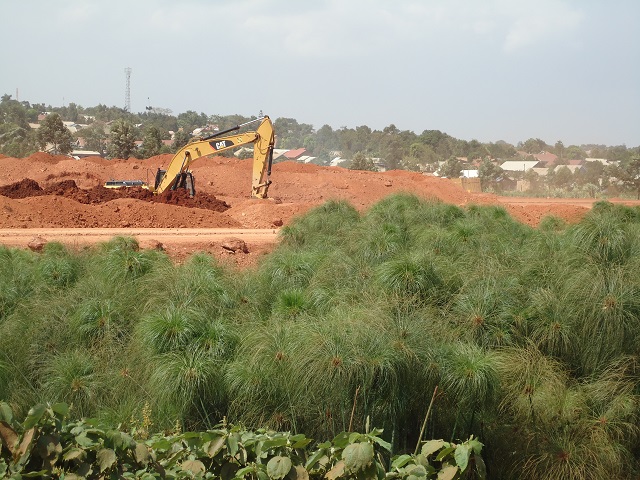
Kampala, Uganda | THE INDEPENDENT | The government has finalized investment guidelines that will ensure that no factory will be established in a wetland. This is part of fresh efforts to protect the environment, as Uganda moves to become a green economy.
The government has consistently been criticized for not caring about environmental conservation despite policies in place, including the enforcement agency, National Environmental Management Authority- NEMA.
Specifically, apart from activities like rice and sugarcane farming, it is common to find large factories constructed in wetlands, after getting investment and production licenses.
The State Minister for Industry, David Bahati says President Yoweri Museveni is due to make a statement to the nation on the new government plans regarding investments and the environment.
He says that the 22 industrial free zones being established around the country will only allow investments that have green technology as their core policy.
The Green Economy concept supported by the UN Environment Program is aimed at ensuring the protection of the environment mainly by reducing carbon emissions and in turn, mitigating climate change effects.
“In a green economy, growth in employment and income is driven by public and private investment into such economic activities, infrastructure, and assets that allow reduced carbon emissions and pollution, enhanced energy and resource efficiency, and prevention of the loss of biodiversity and ecosystem services,” says UNEP.
Speaking at the 2023 Economic Mkutano, an annual dialogue on the current economic issues, Bahati said that the Green Economy Policy recently passed by the Ministry of Trade Industry and Cooperatives, now all industrial parks must abide by the environmental procedures and so must any factory being set up in the park.
The dialogue was organized under the theme: “Unlocking the Green Economic Zone Opportunity for the Private Sector”.
The Executive Director for Uganda Free Zones Authority, Hez Alinda Kimoom blamed the whole issue of regulation of industrial growth, which has allowed people to establish wherever they find space.
According to Kimoom, there are 33 free zones in the country, with most of them being privately owned, and anyone intending to set up business in a free zone must commit to abide by ‘green production’. However, to be licensed as a free zone, there are requirements that must be met including the location suitable for the establishment of an industry.
Olive Kigongo, the President of the Uganda National Chamber of Commerce and Industry challenged the government agencies and the ministry of trade on the lack absence of organized industrialization. According to her, they take responsibility because they are the ones who license the setting up of industries.
Damalie Ssali chief programs and projects officer at the Private Sector Foundation of Uganda (PSFU) argued that while it is important to protect the environment during production, there are things that the private sector, especially small and medium enterprises, do not have the capacity to do.
According to Ssali, even in the industrial zones, where it would be cheaper to operate green production, many SMEs are not aware that they can access the facilities.
Many still think they are meant for large foreign investors. Ssali urged the government to go for international climate funds for low-credit facilities, which can then be used to support the private sector.
On the establishment of factories in wetlands and other areas deemed unsuitable, Ssali agreed that there is a planning problem in Uganda as far as investments are concerned. She gave the example of tourism and agriculture, two main sectors of the economy, saying they are under threat unless the environment is conserved.
Ssali adds that in attracting investors to Uganda, even into non-environment-related sectors, the country’s environment is used as a marketing tool, hence the need for the government to strengthen regulations on the environment.
*****
URN
 The Independent Uganda: You get the Truth we Pay the Price
The Independent Uganda: You get the Truth we Pay the Price



Within the environment are human beings
We pray that the interaction of human dwellings and factories will be addressed
Kawempe local government could interest itself in the valley extending from the Bukoto junction towards Bahai temple; by 1992 the record at the lands office considered the dry areas to for residential purpose
How do established residents cope?